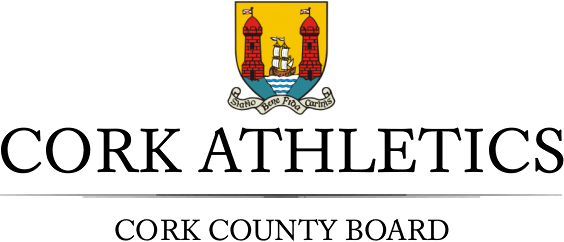Hammer Thrower Declan Hegarty Interview - Marathon Magazine Aug-Sep 1985
Declan Hegarty Interviewed by Fr. Liam Kelleher
Marathon Magazine - August - September 1985
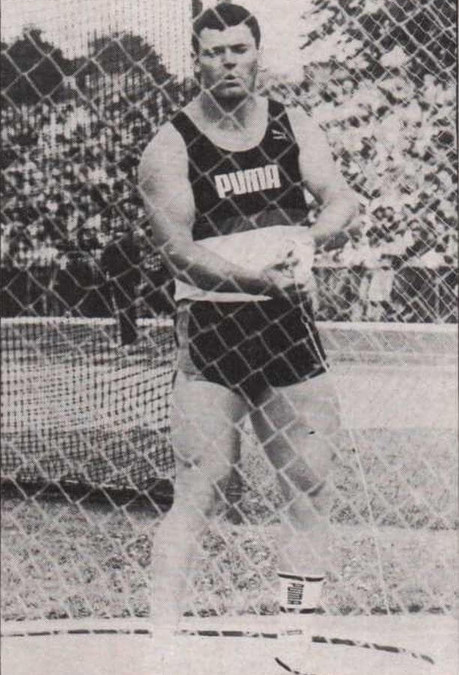
Declan Hegarty, Civil Service AC, throwing at the 1985 Cork City Sports
Download Marathon Magazine article, August - Setpember, P 12 -15
Right in the top flight and planning to stay there is . . . DECLAN HEGARTY
It is not too often that field event athletes get featured in athletics publications. This month we are pleased to bring you an Interview with Declan Hegarty, who became famous with his hammer cage wrecking in Los Angeles last year. He has put that experience behind him, and has reached new heights for all the good reasons this year. Living in Los Angeles, and coached by former Olympic champion Hal Connolly, Declan took time off to talk to me just after setting a C.B.P. at the B.L.E. National Championships in Cork.
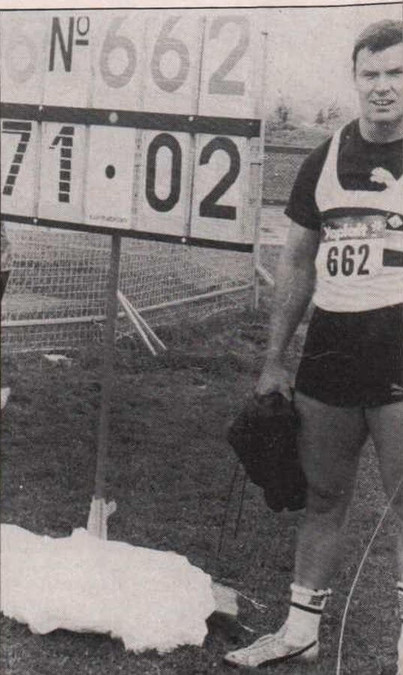 Declan Hegarty after setting a Championship Best at the 1985 BLE National T&F Championships, in Cork
Declan Hegarty after setting a Championship Best at the 1985 BLE National T&F Championships, in Cork
Fr. Kelleher: A wet and windy Cork, a big change from Los Angeles, the West Coast etc., how do you feel after today's performance?
Declan: Under the circumstances, It was O.K., a bit wet and sloppy in the circle. I won the title and that's what I came here to do.
Fr. Kelleher: You were over 70m, was that pleasing to you? Or did you expect to throw better?
Declan: I was hoping for a better throw. It wasn't so much that the circle was slippy but the cold breeze and the rain chilled you a bit.
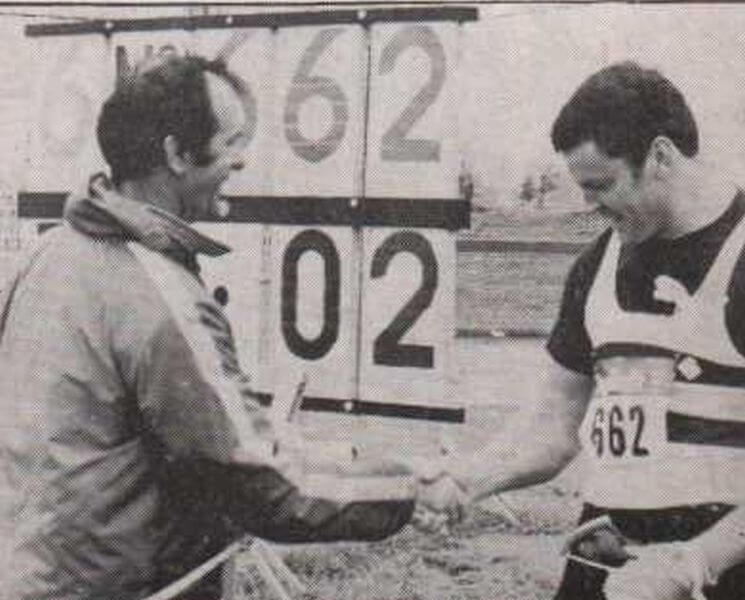
Declan Hegarty being congratulated by BLE President, Paddy McGovern
Fr. Kelleher: Last week-end at Crystal Palace you came second, was that a disappointment for you that you didn't get the gold although it was an achievement to get the silver?
Declan: It is always a disappointment to come second. I threw 76m and that's my third best ever performance. If I could keep up at that level I would be very happy. The problem is that you get worn down from competing week after week. It's tough to keep the form going.
"It is always a disappointment to be second”
Fr. Kelleher: David Smith, a relative newcomer, is after making a big breakthrough. / was expecting a bigger challenge from Martin Garvan and Matt Mileham. Did you know of his phenomenal improvement?
Declan: I heard he had thrown 77m. When he threw 73m at the Cork City Sports I thought it was an earlier big throw that he had got. But he pulled another 77m. throw at the AAA's. That was a surprise and he pulled it out at the right time to take the gold medal.
Fr. Kelleher: He is one of the few that hasn't gone abroad. What is the reason he has made it in the British isles? The conditions are really against it. Is he a man of the future or has he reached his limit?
Declan: It's hard to say if a man has reached his limit. If he keeps throwing as he seems to have been up to this, there is no doubt that he will throw further. He is a very big, athletic thrower. He is working 8 hours a day as an electrician in England and I'm not sure if that will allow him the time to put in the work that he will need to go further. As you get further along, it takes more and more time and commitment per day. In California, I teach for 6 hours a day and then I have the rest of the time off. It's warmer out there and sunnier. It allows you to get a great amount of training in. Fr. Kelleher: At the Cork City Sports where you were second to Sedykh, did you learn anything from that particular performance? Watching Sedykh, your coach, i'm sure took a lot of film of his techniques. Did you learn something from him that will help you in the future? Declan: The more I compete against him the better I get to know the man. When he * throws 10m further than you, it makes
you feel you are missing something. I think it's years and years of commitment. He is thirty years old. He has been throwing from the age of 13. He is nearly 17 years throwing. Each year he got a little bit stronger, improved his technique a little bit, worked on jumps and sprints and trunk strength.
I think we have been overemphasising the weight-room training. I think it's more to do with speed, trunk strength and technique that really comes with these big throws because he is not a very big man. He is just 17 stone, which is big by human standards, but in relation to shot putters and discus throwers he is small.
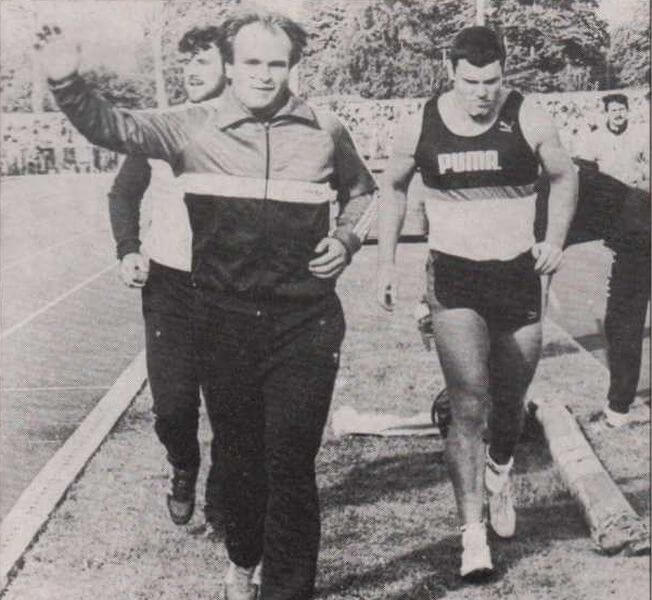
Declan Hegarty, Yuri Sedykh and David Smith on their Lap of Honour at the 1985 Cork City Sports
On Sedykh:
"The more / compete against him the better / get to know the man. When he throws 10m further than you, it makes you feet you are missing something".
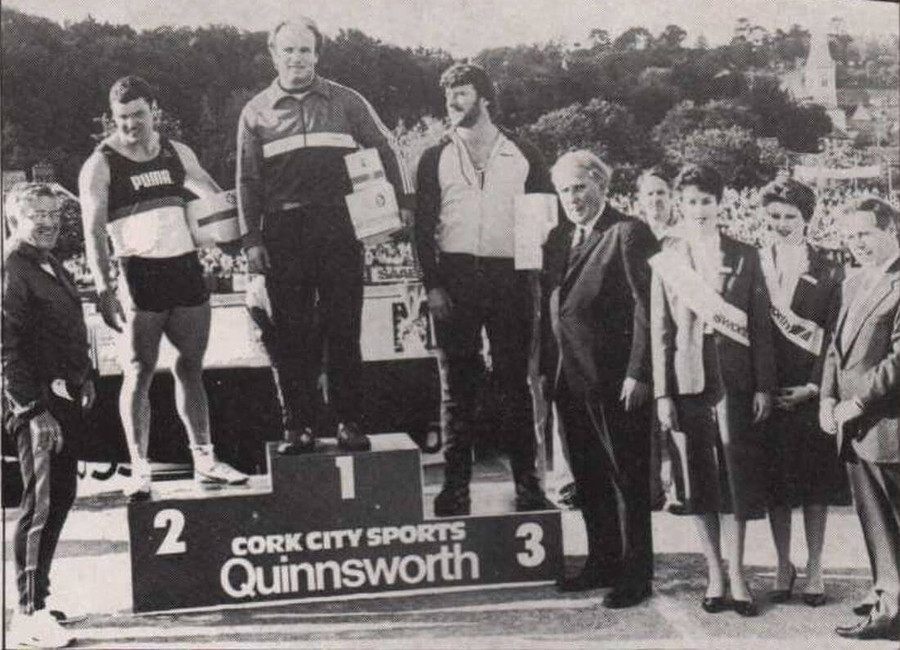
Hammer Presentation at 1985 Cork City Sports, with former Olympic Champions, Hal Connolly and Yuri Sedykh
Fr. Kelleher: Do you think the East Germans, West Germans and the Eastern European countries like Russia have no special secret forumla, that we thought 4 or 5 years ago.
Declan: I think they have a greater number of throwers in a more supervised condition. For an Irish thrower, he is a part-time thrower. He is going to school and he is cyclying his bicycle across the city to get to training. He is not really in a structured setting whereas a young Russian thrower would be in a camp. He might have to take a few classes but he would go out and take a few throws. The coach would be there all the time.
For a coach to do that in Ireland, year in, year out, it would take a lot of commitment. Phil Conway has done that for over 10 years. He has put in his time and it's hard to keep that going. What we need are more coaches out there, putting in more time as opposed to relying on one man like Phil Conway.
Fr. Kelleher: We both attended the European coaching in Edinburgh in 79. Bon Derchur was there, the famous hammer thrower, coach. Was that a turning point for you, going to that particular congress?
Declan: I wouldn't say it was a turning point but it was a positive input. From the start from John Kent in Dublin to Harold Conolly in California, each person I have worked with and each year I have thrown, I have learned some more and I have got fitter and faster and stronger. It has been a long building process that's far from finished. I'm still at another step on a ladder, I should think. Every person, every expert in the event that I have talked to has given me more to think about, more ideas to work on.
Fr. Kelleher: You have given me a lot of your philosophy there. To return to the competition, before the Cork City Sports, what was your competition before that?
Declan: I threw 77-78m out at the Mount Sac relays and 77.40m at the Bruce Jennor meet.
I must say that I see a lot of athletes abusing the privilege of free room and board for four years. They are providing a coach for you who is out there every day to look after you and your technique".
Fr. Kelleher: Did that give you a psychological advantage having beaten the Olympic champion?
Declan: It did. It was multifactorial. First of all I was throwing at my very best which doesn't happen to you all the year round. There is some point of the year where you reach your peak. He wasn't throwing particularly far so it was a combination of those two things that allowed me to catch him. I was trying to keep a realistic view on the whole thing. It is always a pleasure to beat the Olympic champion. It made me think back to the Games last year. I would have liked to have beaten him even more.
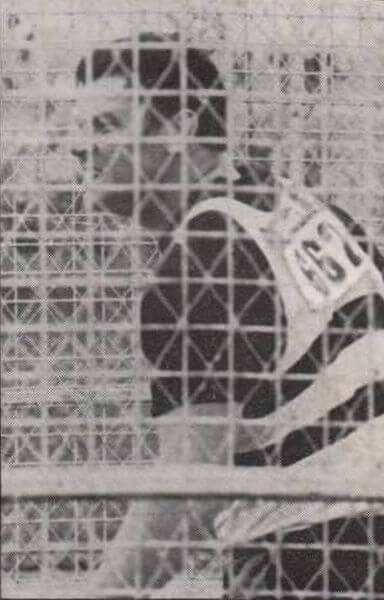 Declan Hegarty
Declan Hegarty
Fr. Kelleher: That brings me nicely to LA. A lot of people would feel that you gained notoriety, not just here but all over the world, with your hammer cage exploits. Looking back now, how do you feel about it at this particular time, and then I will ask you how did you feet when it happened?
Declan: At this particular time when I'm looking back on it, I think it's alright. I'm amused at the whole thing. It created, as one newspaper man said, "I reached athletic immortality". The only other couple of people who reached that like Carl Lewis would have done that through winning gold medals. It looks like he took the hard way around it.
I created more attention than I ever thought possible. From a practical viewpoint the cage is there to stop the hammers from going out of the sector. The hammer event is an event in which the hammers sometimes go out of the sector. All the cage was doing was stopping it. The only problem was it didn't stop it from falling down, the cage falling to the ground. It wasn't supposed to happen. There are lots of meets you go into where the cage isn't structured properly to contain the hammer and you end up throwing them on the track and everybody gets very excited and annoyed at you.
It's like motor racing, you have to go in there. You have to go for it and you take your chances. It may crack up, it may break down on you and it may hold up for you. I think it's a sign of how well prepared you are. Before the Olympics I was a bit erratic. I was throwing into the net too long. Even though I increased my throwing strength I broke the Irish record before the Games. My technique was very hit and miss. I was a little bit unstable. When you get into the qualifying rounds and you have three throws to get over 72m, it's tough to put you in a spot like that.
People who have thrown over 80m are throwing on their first throws at 67m. It's quite an alarming experience when there is 100,000 people roaring and screaming at you. I'm glad I was there and got that experience. If I bomb out at all, I may as well bomb out and attract attention.
Fr. Kelleher: How did you feel about it at the time?
Declan: I was very depressed. I was distraught.
Fr. Kelleher: Did anybody say anything to you that made you more disgruntled?
Declan: It wasn't what people were saying to me but I was annoyed at myself for not being able to go over 72m for the qualifying round. Every time I started accelerating the hammer, it got ahead of me. The 70m throw I had was very easy. I took that throw to set up for the 3rd round. I planned to add a little bit to it. But I added too much to it and it went out of hand.
"As one newspaper man said: I reached athletic immortality. The only other couple of people who reached that, like Carl Lewis, would have done that through winning gold medals. It looks like he took the hard way around it".
Fr. K : We have covered the immediate past and r-e distant past. In between, you spent 4 or 5 years in Boston. Was that part and parcel of your improvement?
Declan: When you leave school in Ireland you are in a situation where you have to start earning your living. You get off work at 5 p.m. and it's dark in Winter. In America it allows you to train in an athletic environment. It gives you free room and board. It gives you a free education at third level. It gives you a coach who is paid full-time to watch you every day.
It also has its bad points, runners are inclined to say that they are overworked, overtrained or overused in the competitions. I must say that I see a lot of athletes abusing the privilege of free room and board for four years. They are providing a coach for you who is out there every day to look after you and your technique. In this day and age a free education is an opportunity not to be missed. All you have to do for that is to go out and do what you love to do anyway. I think America gives you a great opportunity. It prolongs your career another five years and after that you are in the same boat again.
Fr. Kelleher: How did California work out?
Declan: The training I had in Boston was better than the training I was getting in Dublin. It allowed me to train more. It allowed me to train at a higher intensity but the snow in the winter was a big problem. The snow would be down for three months. If you are a shot putter or runner you can throw and run indoors. But the hammer is an event where you need to be outside throwing. Ten feet of snow doesn't help that.
I spent five years in Boston. I spent an extra year there taking my Masters. I decided at the end of the five years that if I wanted to further my hammer career I needed to get to some better weather. As the Olympic Games were being held in L.A. I decided I would go out to the Games and stay there. Fortunately, I met Harold Connolly a few years beforehand. I discussed the matter with him. He said that it shouldn't be any great problem. I moved out there on speculation that I was going to get work in a pub or something just to get settled. I was expecting that it would take a good year after the Games to get even’remotely settled. As it turned out, Harold helped me get this teaching job that I'm in now. I am teaching handicapped kids physical education. Although it's very high intensity type of work I get off work between 2 and 2.30 p.m. It gives me more time than I have had before to keep training.
Fr. Kelleher: What is your major target for the rest of the season and for the immediate future?
Declan: I am hoping to get to the Europa Cup in Iceland from L.A. If I can hold up my present form at that I will be happy. I don't expect much more. I peaked earlier on in the year. Long term, I am thinking of the Europeans next year, the World Championships the year after and then the Games in '88.
A lot of people have asked me: 'Were you not devastated when you bashed the cage to pieces?' The way I looked at it, it was only one more competition and I'm not really throwing just for that one competition. I'm throwing because I enjoy throwing. It's a challenge. I get to throw further every year. The whole think that I'm after is that I like throwing and I would like to keep throwing. A lot of people have said: 'I'm surprised you kept throwing'. No matter how bad you are going there is no sense in tying down on the ground and saying "I’m ruined now”.
Fr. Kelleher: From what you have been saying, Declan Hegarty is a happy man, happy doing his hammer, happy at work and hoping to do well in the future.
Declan: I am happy to throw further and keep it going.
Fr. Kelleher: Thank you, Declan.
Declan Hegarty
Declan Hegarty is an Irish Olympic Hammer Thrower. He represented Ireland at the 1984 Summer Olympics, in Los Angeles. His best throw in the 1984 Olympics was 70.56m, while his personal best, set in 1985, was a throw of 77.80m. Declan retired from throwing due to injury. After several years teaching in the US, he studied medicine.
Dr. Declan Hegarty, Inverness Surgical Associates, General Surgeon
